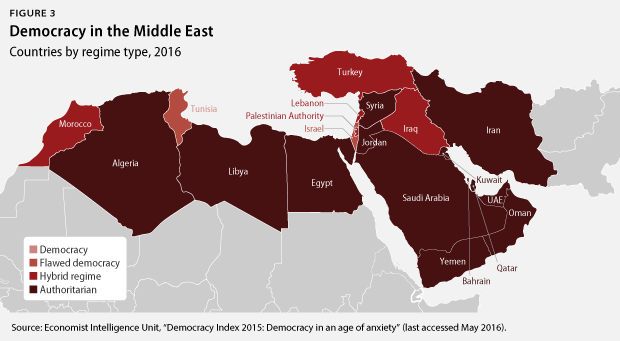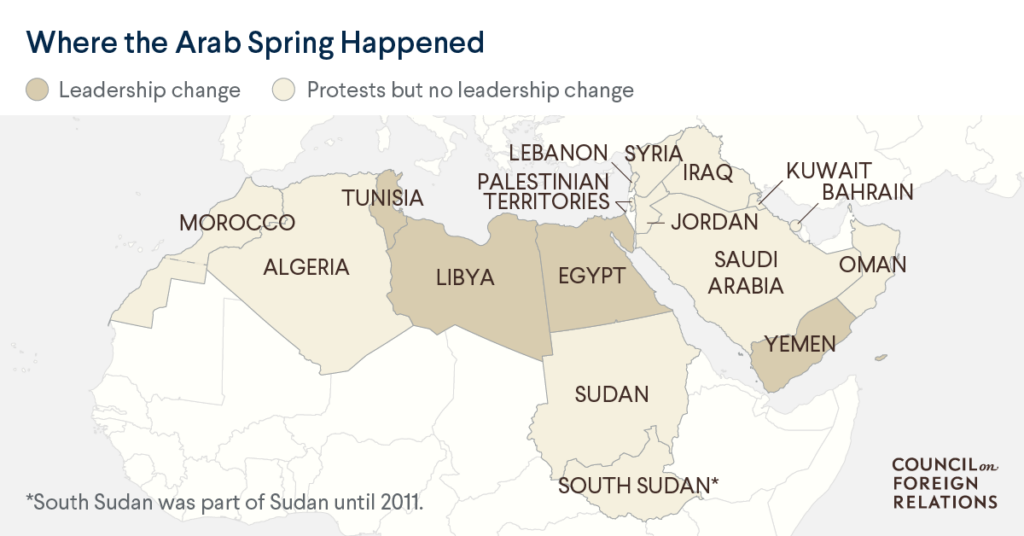
Lisa Anderson, author of the article Searching Where the Light Shines: Studying Democratization in the Middle East, notices how Political Scientists everywhere cannot understand how the Middle East and North Africa have not turned into democracies. With many nations in Latin America and southeast Asia democratizing, Political Scientists remain confused as to why the Middle East has abstained from it. Anderson notes that the largest issues with the current research is that the field remains “profoundly ahistorical” and tries to compare the Middle East to completely different regions like Latin America or the Eastern Bloc without taking into account each region’s vastly different histories and cultures (Anderson 192, 195). Political Scientists assume that industrialization would lead to liberal democracies like in other developing regions, and naturally so. However, because politics in various regions operate differently, attempts to use global or regional theories that are not focused on the Middle East are bound to fall short.
Anderson notes how Political Scientists “all seem to end up at the same old watering holes” because they do not take the region’s history, economic, or social problems, leading to incomplete explanations for the Middle East’s authoritarian nature (Anderson 201). Anderson notes how many researchers believe Islam is the reason that authoritarianism is rampant (Anderson 197). Anderson believes this approach to be misguided, because Islam is the majority religion of a few democracies, and is not a likely reason as to why the region is authoritarian. Anderson shows that Political Scientists have a bias towards democracy, which poses a massive issue when studying authoritarianism. Monarchies, dictatorships, and non-competitive republics have been a larger part of history than democracy, so researchers ought to understand that authoritarianism has been the “norm” (Anderson 200-201). When we think about the Middle East, we do not consider that the region has its own distinct culture, history, and traditions that have survived for centuries. Understanding those will make the study far easier.
When studying authoritarian regimes and the Middle East, we need to have at least a basic understanding of Middle Eastern history and culture. Knowing the Middle East’s colonial past, the age of Arab Socialism, Western intervention, and recent uprisings is crucial to understanding the region. We also need to have a firm grasp on how Middle Eastern economies, cultures, and governments work together to create the environment in which they live. Understanding their economic situations and history are crucial for understanding why the Middle East has a vast number of oppressive states in the region. Economics often dictates how a state operates and tells how governments respond to their populations. Because economics, government, and culture are so intertwined, it is entirely necessary to understand all three to understand why certain regimes can thrive. Rather than focusing on just data and trends, we need to understand the history, economics, and political culture of the Middle East for a comprehensive understanding of the region.

Anderson also wrote her paper before the Arab Spring Uprisings of 2011, which destabilized the region, uprooted a few regimes, and left many areas in ruin. However, most of these states either went into collapse like in Yemen or Libya, or into warfare like Syria and Iraq for a period. Despite these failures, however, there are some optimistic takeaways in favor of democracy in the Middle East. Before the uprisings, democracy possibly coming to the region seemed entirely hopeless. “Western bias” clouded the minds of many Political Scientists during the 1990’s, so when those years were the “high water mark” of democracy coming to the Middle East, researchers went into despair over the region in believing that democracy would never show up (Anderson 191, 195). However, the widespread mobilization of people across the region shows a dramatic sign of life for democracy in the Middle East. There were never as widespread demonstrations as this, so while these uprisings had limited to no effect on the governments of the Middle East, there should certainly be optimism for the region. Political Scientists should be very optimistic for the future of the Middle East.
Bibliography:
Leave a Reply